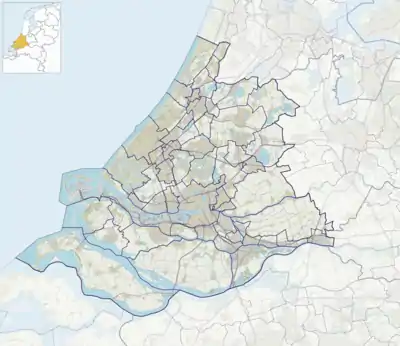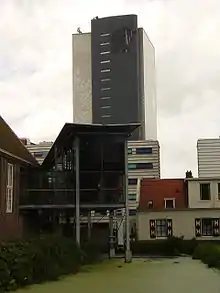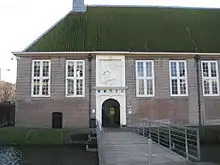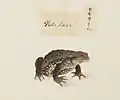Naturalis Biodiversity Center
Naturalis Biodiversity Center (Dutch: Nederlands Centrum voor Biodiversiteit Naturalis) is a national museum of natural history and a research center on biodiversity in Leiden, Netherlands. The museum, except the research facilities, was closed from September 2018 to mid 2019 due to renovations. Temporary exhibitions were held in the Pesthuis (historical Plague hospital) entrance building during the renovations.[5]
Nederlands Centrum voor Biodiversiteit Naturalis | |
.jpg.webp) Mammoth skeleton on display in the old museum | |
 Location in South Holland in the Netherlands | |
| Established | 9 August 1820 |
|---|---|
| Location | Darwinweg 2[1] Leiden, Netherlands |
| Coordinates | 52°09′53″N 4°28′24″E |
| Type | National museum Natural history museum Research center |
| Collections | Zoology, botany, geology |
| Collection size | 37 million objects[2] |
| Visitors | 339,550 (2015)[3] |
| Director | Edwin van Huis[4] |
| Curator | René Dekker[4] |
| Public transit access | Leiden Centraal/LUMC[1] |
| Website | www |
Although its current name and organization are relatively recent, the history of Naturalis can be traced back to the early 1800s. Its collection includes approximately 37 million specimens, making it one of the largest natural history collections in the world.[6]
History
The beginnings of Naturalis go back to the creation of the Rijksmuseum van Natuurlijke Historie (abbreviated RMNH, National Museum of Natural History) by Dutch King William I on August 9, 1820. In 1878, the geological and mineralogical collections of the museum were split off into a separate museum,[7] remaining distinct until the merger of the Rijksmuseum van Natuurlijke Historie with the Rijksmuseum van Geologie en Mineralogie (abbreviated RGM) in 1984, to form the Nationaal Natuurhistorisch Museum (NNM) or National Museum of Natural History.[8]
In 1986, it was decided that the institution should become a public museum, and a new building was designed by the Dutch architect Fons Verheijen. The building's reception area incorporated the 1657-1661 Pesthuis, designed by Huybert Corneliszoon van Duyvenvlucht.[9] Completed in 1998, it was opened on April 7, 1998 by Queen Beatrix of the Netherlands.[7] The new building costs were about €60 million, making it the second most expensive museum building in the Netherlands.
In 2010 the National Museum of Natural History (Naturalis) further combined with the Zoological Museum Amsterdam (ZMA) of the University of Amsterdam, and the Dutch National Herbaria at the universities of Leiden, Amsterdam and Wageningen, to form the Nederlands Centrum voor Biodiversiteit (NCB Naturalis).[10][11][12] The combined institute was formally opened as part of the ‘International Year of Biodiversity 2010’ by Education Minister Ronald Plasterk and Agriculture Minister Gerda Verburg.[13][14]
In 2012 the name became the Naturalis Biodiversity Center.[6] Naturalis has partnered with ETI Bioinformatics in support of the Catalog of Life (CoL), and is working with the Global Biodiversity Information Facility.[15] Funding is in place to support digitization of the massed collections.[10][16] In 2015, further renovation and expansion was planned, with a proposed design from Neutelings Riedijk Architecten to be completed in 2018. The Pesthuis will no longer be part of the complex.[17] However, a lawsuit by the previous architect postponed these plans.
Collection

The current museum is known for the numerous objects in its collections. Prior to the merger with the Zoölogisch Museum Amsterdam and National Herbarium of the Netherlands, there were approximately 10 million zoological and geological specimens in the Naturalis collection. Following the merger with the collections of the Zoölogisch Museum Amsterdam and National Herbarium of the Netherlands in 2010–12, there are now approximately 42 million specimens:[2][10]
|
|
The largest part of the collections are stored in a 60-meter-high tower, a landmark in Leiden, opened in April 1998. Some parts of the collections are stored in a depot in the former museum building at the Raamsteeg in the city center of Leiden.
Explorers
Among the collections at Naturalis are the papers and field notes of a number of early travelers and naturalists, including the following:
|
|
Exhibitions
Permanent exhibitions
The museum has several permanent exhibitions:[18]
- Nature Theater (animals, plants, fungi, one-celled organisms, bacteria, stones, and minerals: an impression of nature in all its various forms)
- Primeval Parade (A parade of fossils shows the history of the earth and the development of life.)
- Earth (Games and signs inform the visitor about the Earth's complexities.)
- Life (It displays how plants and animals live and survive on Earth.)
- Earth Inside (for children and their parents to discover in a playful way how nature works)
- Biotechnology (Games and movies show the visitor how essential DNA is to all life processes.)
- Treasure Chamber (Special security and storage conditions protect the precious gemstones, including a collection that once belonged to the Dutch King William I, and the mounted skins of animals that became extinct over the past few hundred years.)
- A special room at Naturalis, exhibits Trix which is one of the most complete[19] and best preserved[20] Tyrannosaurus skeletons found so far. On top of that, Trix is one of the two only authentic tyrannosaurs that are permanently kept in Europe. The other one is Tristan, which belongs to a Danish proprietor albeit being currently on exhibit at the Natural History Museum, Berlin, in Germany.[21]
Buildings
 Entrance Naturalis (Pesthuis/plague house)
Entrance Naturalis (Pesthuis/plague house) Cash register Naturalis (Pesthuis)
Cash register Naturalis (Pesthuis) Naturalis (Museum and Collections) [2013]
Naturalis (Museum and Collections) [2013] Naturalis (At the right: bridge with zebra pattern)
Naturalis (At the right: bridge with zebra pattern) Panorama with Pesthuis, main museum building and Darwin House
Panorama with Pesthuis, main museum building and Darwin House
Collections
 Papaver orientale, J. M. Prange
Papaver orientale, J. M. Prange
_-_Strombidae_-_Mollusc_shell.jpeg.webp) Harpago chiragra, marine gastropod
Harpago chiragra, marine gastropod Labradorite
Labradorite Propalaeotherium fossil
Propalaeotherium fossil Tyrannosaurus rex Trix fossil in its permanent exhibition room
Tyrannosaurus rex Trix fossil in its permanent exhibition room
Visitors
| Year | Visitors | Year | Visitors | |
|---|---|---|---|---|
| 2008 | 245,275[25] | 2012 | 251,500[25] | |
| 2009 | 266,000[25] | 2013 | 307,500 (est.)[26] | |
| 2010 | 270,000[25] | 2014 | 300,000 (est.)[27] | |
| 2011 | 273,000[25] | 2015 | 339,550[3] |
Naturalis had an estimated 285,000 visitors and was the 15th most visited museum of the Netherlands in 2013.[28] The museum had a record number of 339,550 visitors in 2015.[3]
References
- Getting there, Naturalis. Retrieved on 20 December 2014.
- Collections, Naturalis. Retrieved on 22 november 2020.
- (in Dutch) Maaike Lek, "Naturalis ontvangt voor derde jaar op rij recordaantal bezoekers", Sleutelstad.nl, 2016. Retrieved 2 June 2016.
- Management and Trustees Archived 20 December 2014 at the Wayback Machine, Naturalis. Retrieved on 20 December 2014.
- "Groot deel Naturalis per 31 augustus dicht voor verbouwing" [Large section of Naturalis closed for renovations from August 31]. Unity NU.
- "New logo: Naturalis". The Branding Source. 23 July 2012.
- "Naturalis Biodiversity Center". INTK. Retrieved 10 March 2016.
- Wood, Bernard; Henry, Amanda (2013). Wiley-Blackwell encyclopedia of human evolution. Oxford [etc.]: Wiley-Blackwell. ISBN 9781444342475.
- "Profile - Naturalis – National Museum of Natural History". Saatchi Gallery. Retrieved 10 March 2016.
- Oever, Jon Peter; Gofferje, Marc (20 July 2012). "'From Pilot to production': Large Scale Digitisation project at Naturalis Biodiversity Center". ZooKeys. 209: 87–92. doi:10.3897/zookeys.209.3609. PMC 3406468. PMID 22859880. Retrieved 10 March 2016.
- "Naturalis Biodiversity Center (NBC)". Synthesis. Archived from the original on 11 March 2016. Retrieved 10 March 2016.
- "Zoölogisch Museum, University of Amsterdam (ZMA)". Electronic inventory of European bird collections. Retrieved 10 March 2016.
- "Minister Plasterk opens the Netherlands Center for Biodiversity". University of Amsterdam News. 9 February 2010. Archived from the original on 11 March 2016. Retrieved 10 March 2016.
- "The Netherlands starts the International Year of Biodiversity 2010 by launching new Biodiversity Center". Naturalis. 28 January 2010. Archived from the original on 11 December 2015. Retrieved 10 March 2016.
- Naturalis Biodiversity Center; Smets, E (2014). Self-evaluation report - Research & Education 2009-2013 (PDF). Leiden, Netherlands: Naturalis Biodiversity Center. Archived from the original (PDF) on 11 March 2016. Retrieved 11 March 2016.
- Heerlien, Maarten; Van Leusen, Joost; Schnörr, Stephanie; De Jong-Kole, Suzanne; Raes, Niels; Van Hulsen, Kirsten (25 February 2015). "The Natural History Production Line". Journal on Computing and Cultural Heritage. 8 (1): 1–11. doi:10.1145/2644822. Retrieved 11 March 2016.
- Kromhout, Astrid (2015). "The design for our new museum is ready". Naturalis. Archived from the original on 24 April 2015.
- "Permanent exhibitions". Naturalis. Archived from the original on 29 October 2011. Retrieved 11 March 2016.
- "Trix the T Rex makes her mark on Leiden in new exhibition". DutchNews.nl.
- Pim Kaskes, 2016, Unearthing the background of the Naturalis Tyrannosaurus rex : taphonomy, stratigraphy and paleoenvironment, Master Thesis, Vrije Universiteit Amsterdam
- Tristan Otto, Natural History Museum, Berlin
- "Over 4,000 jam into Naturalis to see new T-Rex Trix". NL Times. 12 September 2016.
- "Eindelijk heeft Naturalis haar T.rex" [Naturalis finally has her T.rex]. Trouw.
- "T. rex in Town - Naturalis". Naturalis Biodiversity Center. Archived from the original on 10 October 2017.
- (in Dutch) Top 55 Museumbezoek 2012 Archived 21 September 2013 at the Wayback Machine, Nederlandse Museumvereniging. Retrieved 2 June 2016.
- (in Dutch) Chris de Waard, "Naturalis trekt recordaantal bezoekers", Sleutelstad.nl, 2013. Retrieved 2 June 2016.
- (in Dutch) Bart Dirks, "Leidse musea tijdelijk dicht: even geen publiekstrekkers", de Volkskrant, 2015. Retrieved on 2 June 2016.
- (in Dutch) Daan van Lent & Pieter van Os, "Musea doen het goed: aantal bezoekers in 2013 fors gestegen", NRC Handelsblad, 2013. Retrieved on 20 December 2014.
External links
| Wikimedia Commons has media related to Naturalis Leiden. |
- Naturalis, official website
- Naturalis extinct birds, 3D presentation
- Naturalis Biodiversity Center at Google Cultural Institute
- Bioportal: access to the Naturalis digital collection